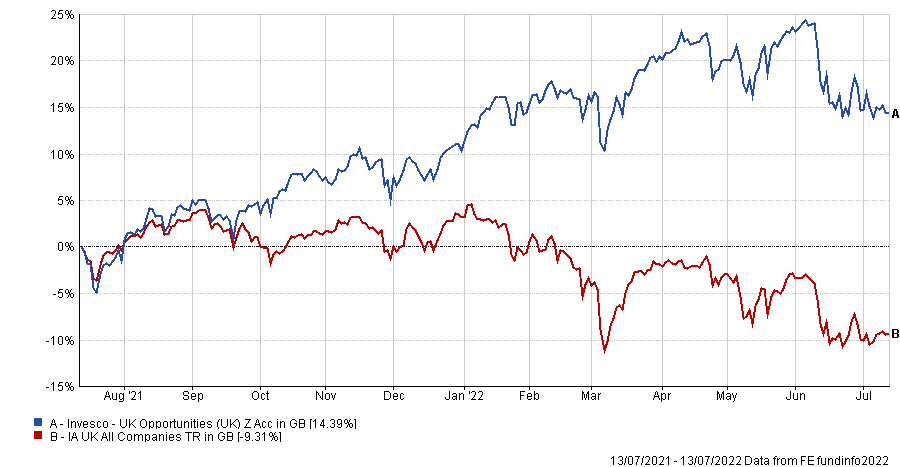The past decade was characterised by low interest rates and free cash that supported the performance of growth investing, creating an unfavourable scenario for value managers.
Despite these setbacks, the Invesco UK Opportunities fund was still able to make a total return of 151.7% over the past 10 years, beating its peers in the IA UK All Companies sector which were up 92.9%.
This outperformance has been accentuated over the past year as the shifting economic landscape placed value back in favour, with the £1bn portfolio climbing 14.4% while the rest of the sector sunk.
Total return of fund vs sector over the past year

Source: FE Analytics
The UK market was filled with undervalued stocks well before Covid struck, according to manager, Martin Walker, with Brexit dragging on share prices since 2016.
Now that investors around the globe are seeking value opportunities to hedge against their growth fund losses, Walker said that he has not seen such high volumes of interest from international clients in years.
Below he also explains why now is the time to buy undervalued stocks and why he has been able to buy Unilever for the first time in 15 years.
What is your investment strategy?
The strongest factor in my investment approach is valuations. I'm looking to exploit value opportunities as they move around the market, so it’s a dynamic active strategy. When I don't find a sector or stock attractive, I just won't hold it.
How has it been as a value manager in a growth market?
Strong, momentum-driven markets are the ones I struggle with and you can see that reflected in performance going back.
Value is a factor that has worked well over the past couple of years more than it has done since the financial crisis. There have been periods of time since financial crisis where value has worked, but generally the tide has been flowing against value managers. I think that the tide has turned.
Going back over the long-term, we can see that it [value] has been a profitable strategy and actually the period of time from since the financial crisis is the anomaly rather than the other way around.
Why should investor’s pick your fund above your peers?
One reason why you’d buy my portfolio rather than just a straight value ETF is that I've added value stock selection in the majority of sectors and that's empirically provable.
Going forward over the next 10 years, markets will be volatile in style – there will be regular rotations so value will work more often than it has.
On average, inflation will be higher which means nominal GDP growth will be higher so, from a subjective perspective, growth companies look less special. In 10 years’ time, long-term investors will have found that value as a strategy has been profitable.
Do you see the UK market becoming more popular as value drifts back into vogue?
UK equities are undervalued as an asset class versus their own history and international peers, particularly the US. If you’re an international buyer, you’ll get a double discount because UK equities are discounted and also the currency is discounted.
I as a fund manager have had more interest from clients now than I've had for a number of years, and crucially, we're seeing interest from international asset allocators.
We're seeing flow from outside of the UK into domestic equities because they can see the opportunity here and it’s a really exciting time for us.
We see value as broad based across the market, not just in certain sectors, and that’s an absolutely key point.
I bought Unilever in the past year, and I haven't held that 15 years, but there’s now multiple evaluation points flagging it as being undervalued.
What’s been you best stock pick over the past year?
DRAX has been a great performer from the lows of the pandemic. You could buy it during the Covid pandemic at one point at £1.50 a share and it is now around £7 a share so that was a significant weighting. [Shares are up 73% over the past year].
I think Drax is a unique asset that’s not yet fully valued. The company burns the residue from chopping wood that the forestry industry doesn’t use and if it can get a government contract by 2030 it could be attaching carbon capture storage onto that.
At that point it will have a scale energy generator capable of generating up to 10% of the UK’s electricity needs so I think that there's potential for significant upside.
In the mining sector, Glencore has also been a standout performer. Commodity prices generally have been high but Glencore also benefited from still having a thermal coal business, whereas Rio Tinto and Anglo American have sold theirs.
What was your worst performer?
I've got quite an idiosyncratic position in precious metals and gold mining equities at around 5.5% of the portfolio. Gold has probably held up better than I might have imagined given rising real rates and a strong dollar.
I only invest in high-end blue chips that are domiciled in America, preferably because I want to be in a safe jurisdiction. I hold the two biggest in the world, Newmont and Barrick Gold, but also hold Agnico Eagle and Wheaton Precious Metals.
Over time, I think the gold price will go higher from where we are now but it's been disappointing.
[Shares in Newmont are down 13.4% over the past 12 months. Barrick Gold’s are down 25.9% while Agnico has dropped 31.3% and Wheaton Precious Metals has lost 25.2%].
What do you like to do outside of work?
Outside of stock-picking I enjoy windsurfing, running, skiing and providing a taxi service to my daughters.





